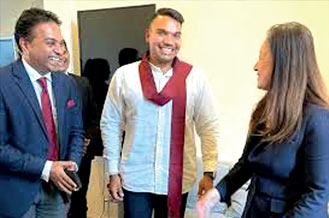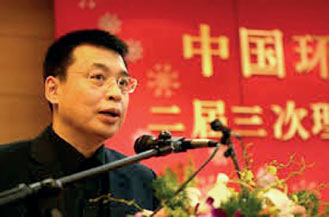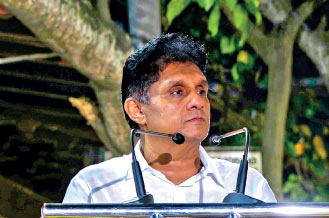A chance from China and JVP-NPP’s Angunakolapelessa axiom
Thursday, 20 February 2025 00:48 – – 70
 Will Namal be made our Imran Khan?
Will Namal be made our Imran Khan?
 China’s Pan Yue: Minister and ‘thought leader’
China’s Pan Yue: Minister and ‘thought leader’
 Top SJB vote-getter in Colombo District
Top SJB vote-getter in Colombo District
 President Anura Dissanayake mustn’t repeat the blunder President Mahinda Rajapaksa made, but he is already doing so. The most favourable moment to resolve Sri Lanka’s ethnic problem was after the destruction of the LTTE in May 2009. As the bipartisan Kerry-Lugar report of late 2009 showed, had the Government implemented the 13th amendment, even the human rights and ‘war crimes’ issues raised by the US would have been placed on the back-burner.
President Anura Dissanayake mustn’t repeat the blunder President Mahinda Rajapaksa made, but he is already doing so. The most favourable moment to resolve Sri Lanka’s ethnic problem was after the destruction of the LTTE in May 2009. As the bipartisan Kerry-Lugar report of late 2009 showed, had the Government implemented the 13th amendment, even the human rights and ‘war crimes’ issues raised by the US would have been placed on the back-burner.
Mahinda Rajapaksa understood the trade-off and was going for it. At lunch in Hanoi on the first state visit by a Sri Lankan leader, he was discussing the advance copy of Kerry-Lugar with me. But his brothers (and top officials loyal to them) blocked the process, each for different reasons. When Mahinda managed to hold the Northern PC election in 2013 it was already too late and attitudes had hardened.
After 2009, the most favourable moment to solve the problem is now, while the mood in the North, East, and South, are centripetal not centrifugal and proto-separatist forces are at their weakest ever.
It is tragic that Mavai Senathirajah and R Sampanthan died without registering any lasting political achievement. If the history of Tamil nationalist politics is not going to end as a tragic farce –the Great Plunge from Dr Neelan Tiruchelvam to Dr Archchuna Ramachandran– Tamil legislators must secure elections to the Provincial Councils of the North and East. When starting from scratch, an elected provincial body comes first; the powers it wields and framework it is within, come later.
Oldest problem, Chinese chance
Our oldest post-Independence problem which is also the country’s most complex and intractable one, is Sri Lanka’s ethnic or ethnonational issue.
India made a sustained input in producing a solution for Sri Lanka’s ethnic problem, but geography, demography and history– proximity, the presence of 80 million Tamil co-ethnics and the complex chronicle of ‘long history’– imparted an aspect of allergy to the Sinhala response.
An important visitor from China due in Colombo can help Sri Lanka resolve the ethnic problem at the root of the Thirty Years War.
“A top-level Chinese delegation led by China’s minister in charge of the National Ethnic Affairs Commission will visit Sri Lanka from February 19 to 23.
The delegation head, Minister Pan Yue, will hold talks with Sri Lankan counterparts on topics related to ethnic harmony and reconciliation efforts, Foreign Ministry sources said.
A key member of President Xi Jinping’s Cabinet, Mr. Pan is tasked with handling China’s minority affairs. He became a full member of the Chinese Communist Party’s (CCP) Central Committee in June last year.”
(https://www.sundaytimes.lk/250209/news/chinas-ethnic-affairs-minister-to-visit-sri-lanka-587382.html)
Minister Pan Yue, an environmentalist, is a rising star as an ideologue and ‘thought leader’ in the dispensation of President Xi Jinping.
Luckily, there’s no contradiction between the Indian efforts and an educative absorption of the Chinese model and experience. The Indian effort has hardly gone to waste. It exists in the form of the 13th amendment, and is a start-line, framework, or foundation. Furthermore, the high-level Chinese visit could clear up the NPP-JVP’s paralytic confusion on the ethnic issue. The JVP isn’t sure that ‘ethnic regional autonomy’ is the solution to Sri Lanka’s ethnonational question. Worse, it isn’t sure there is a distinct ethnic minority question with a political-territorial dimension, apart from the shared socioeconomic problems of underdevelopment. It is dismissive of the 13th amendment and devolution.
The JVP is relatively more likely to give the Communist Party of China a better hearing. I say ‘relatively’ because the JVP has always had its own eccentrically ‘exceptionalist’ attitude to a great many proven postulates of leftism and the successful experiences of ruling Communist parties and the global left in general.
For instance, Minister Pan Yue who heads the National Ethnic Affairs Commission is also Deputy Head of the important United Front Work Commission of the CPC. The JVP-NPP doesn’t believe in ‘United Fronts’ and from its inception in 1965 has never entered United Fronts—only tactical alliances, mostly electoral. That is why the JVP-NPP’s economic performance lacks the experience and expertise that only ‘United Front work’ can accumulate and assemble.
The JVP’s eccentric exceptionalism bears directly on the Ethnic Question. Rohana Wijeweera’s ‘What is the Solution to the Tamil Eelam Struggle’, his 350-page magnum opus, a text endorsed at clandestine sessions (1984-5) of the unfairly proscribed JVP, was published in May 1986, one year before the Indian intervention and the Indo-Lanka Accord (1987). It has a longer diatribe (5 consecutive pages) on me than on Prabhakaran. In its concluding chapter Wijeweera systematically lists every variety of territorial autonomy, including District Development Councils which his party contested in 1981. He condemns and dismisses every single one of them, leaving no room for political-territorial autonomy and self-rule, however modest.
India plus China: Asian fusion
Sinhala nationalists stand for a unitary state but not for autonomy. Tamil nationalists stand for autonomy but not for a unitary state. The Chinese model or more accurately the Sino-Vietnamese model combines regional ethnic autonomy with a unitary state (and Presidential system, I might add).
Sinhala political parties and personalities claiming to be pro-China may nonetheless oppose the Chinese model of ‘ethnic regional autonomy’, unmasking themselves as chauvinists who reject autonomy even within an explicitly, indubitably unitary state, and even when it comes from a non-western, non-Indian source which staunchly supported Sri Lanka’s sovereignty including throughout the Thirty Years War.
By the way, Sinhala nationalists will soon have to decide between cheerleading for Trump and solidarity with China—Trump’s main global target.
Tamil nationalists who oppose China’s ‘ethnic autonomy’ model just as they do the India-facilitated 13th amendment, would unmask themselves as more against the unitary state than for ethnic autonomy.
This deadlock can be broken:
Despite India’s constitutional model being quasi-federal, the 13th amendment and the existing Provincial Council system that arose in Sri Lanka from the Indo-Lanka accord is non-federal; one of devolution/autonomy within a unitary state.
Though India’s (quasi-federal) and China’s (unitary/autonomy) models are different, the Indian-facilitated Sri Lankan model (13A/PCs) and the Chinese model are perfectly compatible and can be superimposed.
President Anura Dissanayake should request the Chinese Minister, highly-rated for his intellect, to share his expert opinion on Sri Lanka’s Provincial Council system and suggest suitable streamlining/improvement. Tweaking wouldn’t need a referendum, only a two-thirds majority. The resultant Indo-China fusion could be an authentically Asian model for Sri Lanka’s ethnic question.
Angunakolapelessa aggression, Matale move
A senior JVP-NPP Cabinet Minister announced that the Government was considering new regulations according to which farmers who receive fertilizer and water for irrigation from the state – the public coffers—would be compelled by law to give or sell at the state’s fixed price, a stipulated portion of their harvest to the state’s Paddy Marketing Board. He thought it a fair exchange.
President Anura Kumara Dissanayake delivered an indelible reply to a very friendly panel on a very friendly TV station which timorously raised the question as to how democratic it would be to deploy the army as he had threatened, in the matter of busting hoarding and securing paddy stocks. “In the matter of rice, what democracy?” Anura snapped back.
The unintended ironic humour of the Ministerial suggestion to impose a mandatory share of produce that has to be sold to the state by the farmer, is that this is the very acme of semi-feudal sharecropping or ande cultivation which was legally capped/restricted by the Paddy Lands Act (1958) of Philip Gunawardena in the SWRD Bandaranaike administration. Sharecropping means that in exchange for being allowed to farm on land belonging to the rich/large landowner, a stipulated share of the produce must be surrendered by the tiller of the land.
Under JVP-NPP rule, are we to return to semi-feudalism with the state playing the landlord, or to corporate farming with the state as the company that provides the inputs for which the farmers must surrender part of their produce? This is a reactionary retrogression from what has prevailed since Independence and especially since 1958.
Another Ministerial observation is that the system of granting land titles to the landless—a progressive practice—has led to land fragmentation. One would have thought a rightwing Minister fronting for corporate farming made the criticism. He does not give his alternative: largescale commercial farms? Collective farms? Cooperative farms?
The attack by JVP-NPP activists on a seminar to be conducted in Angunakolapelessa on the problems faced by the peasantry, is shocking but hardly surprising. It made national TV news. The on-the-record rhetoric of the attackers was one of intolerance of dissent. It was totalitarian. (https://www.youtube.com/watch?v=njO7eSiWl_A&t=1s)
The late-middle aged convenor of the aborted seminar –sarong-clad, grizzled, with salt-and-pepper-hair and stubble, decidedly no former leader of the Inter-University Students Federation– understood what’s going on more lucidly than mainstream Opposition parties, civil society organisations or cheer-leading, fellow-traveling pro-NPP academics:
“…However, convener of the conference Wimal Wattuhewa said the Janatha Vimukthi Peramuna (JVP) has showed its usual inclination towards violence and that he was compelled to suspend the conference. He said the JVP is not in a position to understand the issues affecting the agricultural sector, which is now dominated by multinational companies and large-scale rice mill owners.”
(Farmer conference sabotaged – Breaking News | Daily Mirror)
TV news ran a mobile phone video recorded in Matale of an emissary of the JVP-NPP government visiting a household and communicating a cautioning from his party to a young man in a house in shabby disrepair, who had posted on his FB account a ‘politically incorrect’ comment critical of the government. The emissary warned:
“you are just one man and you are trying to go head-to-head with the government. You can try that if you wish, but soon our government will take steps against you. The party has sent me to warn you about that.” The young man riposted robustly and went on to file a complaint with the Police. (https://www.facebook.com/share/v/1B6TYtL4Bh/)
What is most distressing is that such aggressive disruption (Angunakolapelessa) and Orwellian intimidation (Matale) cannot be dismissed as an excess of zeal at the JVP’s grassroots because there was no daylight between that coercively disruptive behaviour and the on-camera remarks of the Deputy Minister of Defence that the Government has no intention of relinquishing power even if it fails in its endeavours. AKD has said that the NPP-JVP will step down only after completing the change they intend for the country. It is one thing to pledge that he will fulfil his mandate within his first term. It is another to assert that the Govt will not step down before its task is completed and will step down only after completing its task—with no pledge that it will step down if and when the people vote against it at a scheduled national election.
‘March separately, strike together’
A new edition of a book by journalist Dharman Wickremaratne tells the story of the JVP’s indoctrinated assassin who killed Vijaya Kumaratunga among dozens of others including the Vice-Chancellor of the University of Colombo. (https://www.ft.lk/ft-lite/Dharman-s-Comrade-Lionel-relaunch-today/6-773054)
The JVP has never repented this and a whole campaign of murdering political rivals and dissenters (let’s leave aside armed Police and soldiers). It has merely moved on. The problem with just moving on without repentance is that the root causes i.e., the reflexes and ghastly ethics which led to the barbarism, have not been extinguished. This is clear from the aggression in Angunakolapelessa. Behavioural backsliding is even more of a possibility when the leadership of party and government seems to have removed guardrails in its discourse and implies it will stay in office open-endedly.
The political parties of the Opposition as well as civic organisations must strive to deter or constrain the ruling JVP-NPP’s undemocratic and coercive impulses, starting with the upcoming Local Government election process. All Opposition parties should enter a Pact which enshrines a post-election ‘tactical voting’ agreement to support whichever Opposition party or faction is in the lead, to form non-JVP-NPP administrations at every possible level, up and down the line—as a counterweight.
For its very survival and that of democracy, the Opposition should implement Leon Trotsky’s famous dictum: “March separately, strike together!”
AKD ain’t no CBK
A Sri Lankan commentator with the rare distinction of being published in the New York Review of Books pointed out in the Daily FT that President Chandrika Bandaranaike Kumaratunga was a manifest disappointment, but was re-elected because Ranil Wickremesinghe and the UNP were weak competition. Her point was that however poorly the NPP continues to perform, it could get a second term if Sajith and the SJB remain “in denial”. Her criticism is more than fair, but the speculative comparison is less than tenable:
 CBK won 63% of the vote and was perched on a very high branch while AKD is a minority president with 42% — rock-bottom would be a much shorter drop for him.
CBK won 63% of the vote and was perched on a very high branch while AKD is a minority president with 42% — rock-bottom would be a much shorter drop for him.
 The quality of AKD’s Cabinet compares pretty unfavorably with CBK’s, which had Lakshman Kadirgamar, GL Peiris, Mangala Samaraweera, Mahinda Rajapaksa and Sarath Amunugama among others.
The quality of AKD’s Cabinet compares pretty unfavorably with CBK’s, which had Lakshman Kadirgamar, GL Peiris, Mangala Samaraweera, Mahinda Rajapaksa and Sarath Amunugama among others.
 CBK’s Prime Ministers were (successively) Sirima Bandaranaike and Mahinda Rajapaksa.
CBK’s Prime Ministers were (successively) Sirima Bandaranaike and Mahinda Rajapaksa.
 AKD is enmeshed in a draining foreign debt repayment crisis which will intensify in 2027-8; CBK wasn’t.
AKD is enmeshed in a draining foreign debt repayment crisis which will intensify in 2027-8; CBK wasn’t.
 CBK was re-elected also because the sole available alternative was Ranil, not a Karu-led UNP.
CBK was re-elected also because the sole available alternative was Ranil, not a Karu-led UNP.
Sri Lankans today have at least two Oppositional options. This not being Pakistan, one doubts that the judicial excision of Imran Khan can be repeated on Namal Rajapaksa. Even if SP-SJB remain “in denial”, a CBK-style second term for AKD or the NPP (even with Harini as Hillary Clinton or Kamala Harris) is highly improbable.
SJB’s Colombo District leader
Mawrata, the politically punchy, well-informed e-paper run by veteran journalists Thushara Gunaratne and Upul Joseph Fernando, known to be sympathetic to the SJB, carries a fascinating paragraph in the political column of its latest edition under the subhead “Who is SJB beneficiary?”:
“…Information has now been received by the ‘Inside Politics’ column about another special matter. That is, instead of presenting SJB leader Sajith Premadasa as the SJB candidate in the 2024 Presidential Election, the ‘US Aid’ has spent a large amount of money since 2019 to make another prominent MP from the opposition, who is said to be educated, as the Presidential candidate. Through this, it is identified that this MP has been given a large amount of money to seize the SJB leadership, destroy the image of SJB leader Sajith, and enhance this MP’s image.” (https://mawratanews.lk/news/62596/)
Though Dr. Harsha de Silva whinges on camera that he should have been made the SJB’s Colombo District leader but wasn’t, he clocked a 5-digit vote to Sajith’s 6-digit vote at the parliamentary election. Sajith came first by 64,000 votes more than Harsha.
Harsha has already applauded AKD’s rose-tinted Ranilian Budget on X, for “embracing economic liberalization”. He “sees it as a victory”.
The SJB’s highest vote-getter in Colombo is logically the party’s Colombo District leader. Colombo’s SJB voters can be proud that their leader is not only the party leader but also the Leader of the Opposition.





